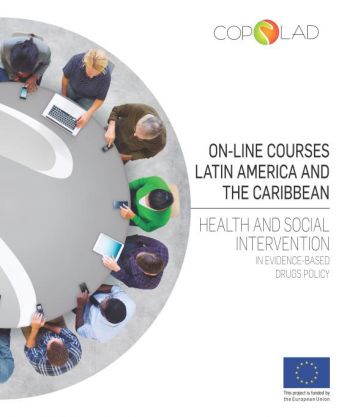Online training courses
Return
General background
As part of the second component of "Demand Reduction (DDR)", COPOLAD has a sustainable capacity strategy in DRR. The strategy aims to expand the approach and the coverage of key areas for planning and implementing DDR policies and strategies.
Based on regional DDR’s needs identified in a study conducted in 2011 and from country's demands, COPOLAD has created courses addressed to professionals from the public sector that works in the drug abuse problem from different perspectives (professionals responsible for planning, for decision-making, for management of health, members of the National Drug Agencies, etc.).
Countries, along with COPOLAD, are leading the development and implementation of the courses and different organisms such as the PAHO/WHO, CICAD/OAS, RIOD and IDPC, as well as members of the Educational Steering Committee for the COPOLAD virtual courses.
- All the courses are available in Spanish and English.
- Topics of the courses have been developed by experts in the region in each thematic area.
National and international editions
COPOLAD offers to the CELAC this virtual training on Drug Demand Reduction capacity-building through national and/or international editions.
- International editions. COPOLAD implements only one international edition for each language. Countries are invited and given a number of scholarships to be managed by the National Drug Agencies.
- National editions. Countries lead and implement the own National editions of the courses. COPOLAD cedes the contents of the courses and the training platform to the countries interested in making their own edition to train their professionals. The COPOLAD team provides technical support to the needs that may arise during the implementation process.
Training procedures
COPOLAD goes for a self-learning process which professionals proceed to study the course contents autonomously, being able to combine a period of training with professional work.
In order to guide the self-learning, each course has a pedagogical tutor. The role of the tutor is to guide the student in the different stages of the training; advise and attend the student's demands; and proceed to evaluate the learning process.
As a training space, the courses are contained in the "Moodle" learning platform https://moodle.com. The pedagogical tutor manages the management of the platform and the students have access at all times.
Structure of a course
Each course consists of a series of topics uploaded on the Moodle platform (virtual classroom). Following the tutor indications, the participants have to download the topics, and read and study the contents.
Each course has round 11-13 topics.
Evaluation methodology
At the end of the reading and learning period of each topic, a self-administrated test is enabled in the platform. The student has to answer a series questions and for each answer, a feedback is provided.
For each topic, a discussion space “forum debate” is enabled. The tutor guides the debate through questions, reflections, key concepts, readings, etc. in order to the students participate expressing and exchanging their ideas, thoughts, contents, etc. This part is evaluated by the tutor through an evaluative rubric.
Access to Online Platform
-
On-line courses Latin America and the Caribbean. Health and social intervention in evidence-based drugs policyDownload in Spanish Download in English
-
Virtual Training leaflet Go to publicationDownload in Spanish Download in English
Related activities
-
2.5 - Further expansion of the capacity-building strategy in DDR
-
The use of alcohol and other drugs: Evidence-based prevention
Go to activityOnline
-
Comprehensive and Integrated Drug Related Socio-Sanitary System at the Primary Care
Go to activityOn line
-
Public Health approach to drugs policies
Go to activityOn line
-
Comprehensive approach to the prevention and reduction of the adverse consequences of drug use in populations in situation of high vulnerability: a public health strategy
Go to activityOn line
-
- Online training courses
- First course: Use of Alcohol and other Drugs: Evidence-Based Prevention
- Second course: Comprehensive and integrated drug related socio-sanitary system at primary care
- Third course: The Public Health Approach in Drugs Policies
- Fourth Course: Comprehensive approach to the prevention and reduction of the adverse consequences of drug use in populations in situation of high vulnerability: a public health strategy
- National editions


